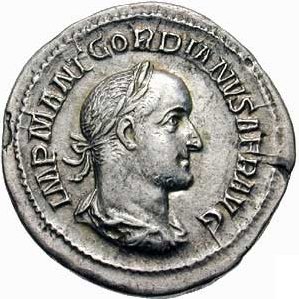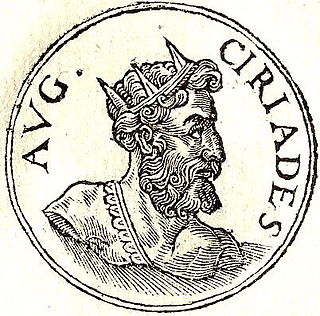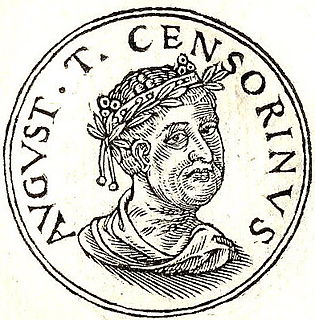
Marcus Aurelius Severus Alexander was a Roman emperor, who reigned from 222 until 235. He was the last emperor from the Severan dynasty. He succeeded his slain cousin Elagabalus in 222. Alexander himself was eventually assassinated, and his death marked the beginning of the events of the Third Century Crisis, which included nearly fifty years of civil war, foreign invasion, and the collapse of the monetary economy.

Year 309 (CCCIX) was a common year starting on Saturday of the Julian calendar. In the Roman Empire, it was known as the Year of the Consulship of Licinianus and Constantius. The denomination 309 for this year has been used since the early medieval period, when the Anno Domini calendar era became the prevalent method in Europe for naming years.

Gordian II was Roman emperor for 21 days with his father Gordian I in 238, the Year of the Six Emperors. Seeking to overthrow Emperor Maximinus Thrax, he died in battle outside Carthage. Since he died before his father, Gordian II had the shortest reign of any Roman emperor in the whole of the Empire's history, at 21 days.

Decimus Clodius Albinus was a Roman imperial pretender between 193 and 197. He was proclaimed emperor by the legions in Britain and Hispania after the murder of Pertinax in 193, and proclaimed himself emperor again in 196, before his final defeat the following year.

The gens Julia was one of the most ancient patrician families in ancient Rome. Members of the gens attained the highest dignities of the state in the earliest times of the Republic. The first of the family to obtain the consulship was Gaius Julius Iulus in 489 BC. The gens is perhaps best known, however, for Gaius Julius Caesar, the dictator and grand uncle of the emperor Augustus, through whom the name was passed to the so-called Julio-Claudian dynasty of the first century AD. The nomen Julius became very common in imperial times, as the descendants of persons enrolled as citizens under the early emperors began to make their mark in history.

Marcus Clodius Pupienus Maximus was Roman emperor with Balbinus for three months in 238, during the Year of the Six Emperors. The sources for this period are scant, and thus knowledge of the emperor is limited. In most contemporary texts he is referred to by his cognomen "Maximus" rather than by his second nomen Pupienus.

The Historia Augusta is a late Roman collection of biographies, written in Latin, of the Roman emperors, their junior colleagues, designated heirs and usurpers from 117 to 284. Supposedly modeled on the similar work of Suetonius, The Twelve Caesars, it presents itself as a compilation of works by six different authors, written during the reigns of Diocletian and Constantine I and addressed to those emperors or other important personages in Ancient Rome. The collection, as extant, comprises thirty biographies, most of which contain the life of a single emperor, but some include a group of two or more, grouped together merely because these emperors were either similar or contemporaneous.

Cyriades was a Roman rebel who betrayed the city of Antioch to Shapur I sometime during the 250s. His chief claim to fame is that he is enumerated as one of the Thirty Tyrants who supposedly tried to overthrow the emperor Gallienus.

Trebellianus was a Roman usurper listed among the thirty tyrants in the Historia Augusta. Modern historians consider this figure a character invented by the author of Historia, whose traditional name was Trebellius Pollio.

Titus Cornelius Celsus, supposedly a Roman usurper, who rebelled against Gallienus. He was one of the so-called Thirty Tyrants enumerated by Trebellius Pollio. His historicity is doubted by some scholars, who consider him an invention of the Historia Augusta.

The Dictionary of Greek and Roman Biography and Mythology is an encyclopedia/biographical dictionary. Edited by William Smith, the dictionary spans three volumes and 3,700 pages. It is a classic work of 19th-century lexicography. The work is a companion to Smith's Dictionary of Greek and Roman Antiquities and Dictionary of Greek and Roman Geography.
Julius Paulus, often simply referred to as Paul in English, was one of the most influential and distinguished Roman jurists. He was also a praetorian prefect under the Roman Emperor Alexander Severus.

Appius Claudius Censorinus was a fictional usurper against Roman Emperor Claudius II, according to the unreliable Historia Augusta. He is included in the list of the Thirty Tyrants.

Titus is one of the Thirty Tyrants, a list of Roman usurpers compiled by the author(s) of the often unreliable Historia Augusta. Titus was said to have revolted against Maximinus Thrax, a Roman Emperor who ruled 235-238, after the revolt of Magnus. It is now believed that his biography is fictitious, and that he may be based on person named Quartinus mentioned by the historian Herodian.
The gens Septimia was a minor plebeian family at ancient Rome. The gens first appears in history towards the close of the Republic, and they did not achieve much importance until the latter half of the second century, when Lucius Septimius Severus obtained the imperial dignity.
The gens Catilia was a Roman family of imperial times. It is best known from Lucius Catilius Severus, consul in AD 120, and subsequently praefectus urbi. He was the maternal proavus, or great-grandfather, of the emperor Marcus Aurelius. At one time he hoped to obtain the empire himself, but he was removed from his office after expressing his disapprobation at the adoption of Antoninus Pius, who had been his colleague in the consulship.

Theoclia was a Syrian Roman noblewoman.
The gens Messia was a plebeian family at Rome. The first person of this name to appear in history is Vettius Messius, a Volscian soldier whose courage inspired his comrades in a desperate battle against the Romans in 431 BC. It is not known when the Messii first obtained Roman citizenship. Members of the family appear in the lists of annual magistrates during the final decades of the Republic. In imperial times, some of the Messii achieved the highest offices of the Roman state.
The gens Ovinia was a plebeian family at Rome. Members of this gens occur in history toward the end of the Republic, and from then to at least the fourth century. They produced generations of Roman senators, with Gaius Ovinius Tertullus obtaining the consulship toward the end of the second century.













